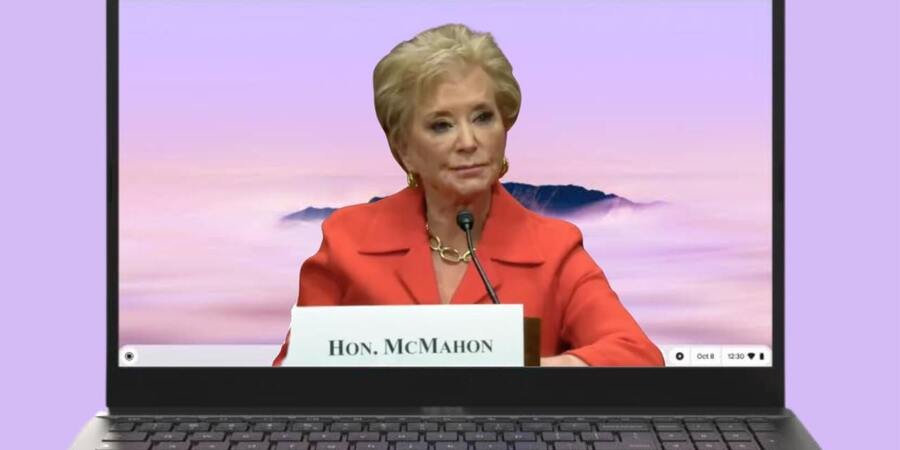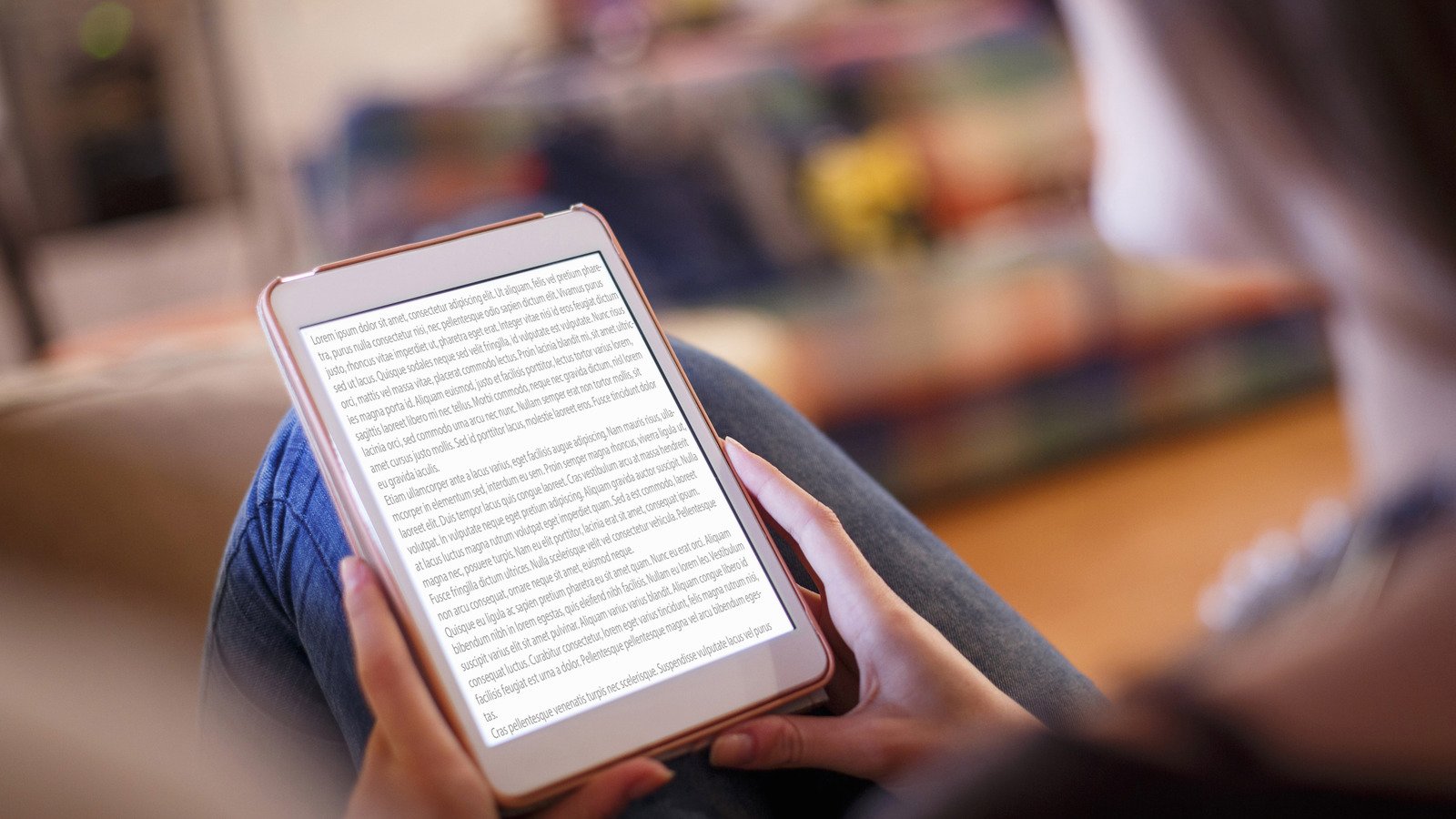Kids don’t need Chromebooks. They don’t need apps. They don’t need portals.

Kids can’t read. They can’t do math. They barely do any work at all and half the time they don’t even bother to turn it in. The state of education in the United States is in a horrifying state. Test scores keep slumping year after year despite the insane amount of money flushed into the school system by federal, state and local governments. It feels like every year since the Department of Education was created in 1980 we’ve seen failure compounded.
Trump’s nominee for Education Secretary Linda McMahon sat for her confirmation hearing on Thursday, though Trump has already said that he’d like to see her step into the role and do away with her own job by dismantling the bloated bureau and moving its responsibilities to other agencies. McMahon has said she’s down with that.
Education didn’t used to be this way and it doesn’t have to be this way now. As each agency begins to follow in the DOGE footprint, ripping apart government spending, jettisoning wasteful project after wasteful project, the DOE should start by pulling all funding for in-classroom technology.
Kids don’t need Chromebooks. They don’t need apps. They don’t need portals. Kids need teachers who are passionate about their discipline. They need books and paper. They need hands-on learning. This tech wasn’t funded out of nowhere. Chromebooks and the portals they are used to access have all been justified expenditures under Title I, which is about improving academic outcomes for disadvantaged students. But replacing books and teachers with Chromebooks has not produced better outcomes at all.
“It’s making them hate school, kids don’t find value in it,” Moms for Liberty’s Tiffany Justice told me. She said the issue is “how much time they’re actualy spending on portals and programs. It’s become a babysitting mechanism and you can have teachers who are not qualified but are just overseeing use of the portal. This is the worst for 6th to 9th grade,” she went on. “We’re losing our kids.”
Use of Chromebooks in every classroom, apps, software and various tech tools have all replaced actual teaching and actual learning. The most essential thing in education are teachers who are passionate about their disciplines and want to share that love of learning with students. These are the kinds of teachers I was fortunate enough to have. Justice told me this was her education experience as a child too. Not all my teachers were like that, but enough to instill in me a love for music, art, literature and most importantly, learning and intellectual curiosity.
Mrs. Fife in 4th grade taught me about theater and that math wasn’t that bad. Mrs. Narjunas in middle school started my love of music. By high school, a Catholic girls school, there was my Boston Brahman Western Civ teacher whose name I can’t remember but whose voice I can imitate and taught us about Chaucer and Renaissance art. At the Friends school I transferred to after that, there was Lisa, Peter, and Mr. Koons for drama, lit, and history, respectively. And the best teacher I ever had was our choir teacher Larry Hoenig who took us seriously, had high expectations, and accepted no excuses for less than excellence. At the time, it was grueling. In retrospect, it taught me how to hold myself to high standards and not give up even if it were easier to fall short. None of these teachers had any other educational tools than books, lessons, pianos, a conductor’s baton, and their own diligence.
“Sure,” people tell me when I complain about the technocratic educational system, “but technology is a key component of modern life, kids need to know how to use it.” To that I counter: kids KNOW how to use it, they know intrinsically, innately how to use it. The first time any kid is handed a smart phone, a touch screen, or even a PC, they know right away, without being told or taught, how to use it. Just like kids of yore knew what to do with crayons and how to climb trees, these kids know what to do with tech.
“Not all schools are like that,” other parents will say, letting me know about some perfect special school in Utah somewhere where the wait-list is five years long and all the children learn to grow their own apple trees from sapling to orchard in pre-K through 12. To those parents I say: what about the rest of the children who don’t live near this idealistic educational institution? What about the kids in public schools who are crammed into classrooms from homeroom to the final bell without the benefit of these caring, considerate, nurturing Montessori or Waldorf trained angel teachers?
The response to that is inevitably “homeschool” or “school choice.” Homeschool is great for those who can do it, but it’s a full time job. Is it worth it? I bet for many kids and families it is. Is it something you can do while also working full time to make sure food is on the table and a roof is over heads? Not without being some kind of magic person. I’m sure these magic parents are out there, and God bless them, but it doesn’t work for everyone. And as for school choice: that’s great if there’s a school to choose from, but if there isn’t, the choice is the local school. Schools will grow, sure, as school choice legislation comes into popularity, but they aren’t here now.
What is here now are public schools and they are funded by local, state, and federal governments and our kids’ futures are too important to just kick these schools under the bus. We need them to be better now.
Chromebooks became ubiquitous during the pandemic when students were sent home from school and forced to attempt to attend classes on computers. During that first pandemic year, Chromebook sales in the US surged 87%. The Department of Education encouraged schools to invest in what they called technology infrastructure using funds set aside for pandemic relief. Once President Joe Biden came into office, he pushed more and more funds to schools for technology and for internet connectivity so that more kids could get online to be taught by teachers on Zoom calls.
Once school was officially back in session, the Chromebooks were already primed and ready to go, they’d been normalized, standardized, and become a relied upon tool by teachers. Not only that, but all kinds of apps had blossomed up from the ether to fill the on-screen void. Some were already in existence, like IXL Learning, which started in 1999, or iReady, while others likely sprung up specifically because there was a market for them. The apps for math, science, English language arts, social studies and whatever else found ways to encourage schools to get funding for those apps under Department of Education grants under a variety of various titles. But they are only making education worse.
IXL Learning provides infinite homework for students of all ages. The idea is the students can use the program to reinforce skills learned in class, but in reality it provides a homework or classwork environment that gives question after question that are graded in real time and a student does not complete the task until a certain “smart score” is reached. It is not engaging, it does not further learning or comprehension, and it is federally funded under 9 different federal school funding programs. The program is in use by 1 in 10 American school students. But it really, really sucks. I’ve sat with my son while he goes through the exercise in complete futility, the only goal being to finish the portal’s assignment.
Here’s how it works: the program asks a question, the kid answers it, if the kid gets it right, they get points and they get another question. If the kid gets it wrong, they lose points and get a new question that is slightly less difficult that the previous question. Rinse, repeat. But what isn’t included is any instruction. If a kid keeps answering the questions wrong, they keep losing points, and because homework isn’t completed until a certain “smart score” is reached, continuous wrong answers lead to never ending homework.
The program is used in classrooms and in homework and the argument is that it reinforces skills. In many cases, it does not supplement but replaces text books, hands-on learning, and actually writing things down. It is in place for mathematics, social studies and English language arts (ELA). Success in IXL accounts for a portion of a student’s final grade. Meanwhile, it is tedious, it is laborious; it has no redeeming qualities.
No one is paying attention to the curriculum being shared through these modules, either, and often, Justice told me, they lack context or any kind of historical accuracy. Children don’t gain an understanding of the subject matter, they’re just trying to get the right answer and be done. No learning is actually taking place.
“We’ve taken these kids who were in school during Covid and obliterated their love of learning,” Justice said, “and also destroyed their idea that anyone cares about what they’re learning or even cares that they’re there at all. We’ve lost the personalization of teachers who care. There’s no love of learning, students are just going through the motions.”
The apps are able to claim that they qualify for Title I programming, which are funds set-aside for disadvantaged students and school districts. Funding can be procured through Title II, Part A, which is intended to increase achievement among students through increasing the quality and effectiveness of educators and administrators, a program administered by each state that receives funding.
Title III provides funding for apps through the Office of Postsecondary Education (OPE). This set of grants is meant to “strengthen institutions.” The program description reads that it is meant to help Institutions of Higher Education “become self-sufficient and expand their capacity to serve low-income students by providing funds to improve and strengthen the academic quality, institutional management, and fiscal stability of eligible institutions.” Obviously, that means apps on Chromebooks and portals.
Title IV is meant to fund programs to keep kids off of drugs. IXL Learning, which provides infinite homework for children of all ages, claims that their boring, rote, endless programs are so engaging that they help keep kids off of drugs. What’s more likely is that kids who don’t take to their programs end up being diagnosed with ADHD and on prescription drugs. Department of Education funding for rural school districts gets siphoned off to apps and Chromebooks, as does funding from the Indian Education Act that is meant to aid Native Americans, Alaskan Natives, and Native Hawaiians. Funds for homeless students goes to apps and Chromebooks, too.
How does plunking a kid down in front of a Chromebook do anything other than leave kids alone with that flickering blue light that comes from computer screens? They also let schools off the hook by letting the portals and apps do the “teaching.” As Justice said, it’s far easier to give a kid a Chromebook with a bunch of apps than to actually construct a lesson plan. There are problems in teaching, too, that have been well explained by education activists and researchers. Teachers have been indoctrinated by their grad schools, for sure, and that is also a problem. They are being asked to do more than teach at this point, too, with all kinds of additional adds to their tasks through the community schools model.
Justice said that she thinks there’s an opportunity for a conversation on getting these programs out of schools, of addressing the titles and regulations and reprioritizing student achievement. There’s every likelihood that the titles that are being used to justify expenditures that harm student achievement aren’t being properly applied when they’re used to cover Chromebooks and infinite, irrelevant, homework.
I may be hopelessly 20th century, and I may be tired of seeing the kids look like zombies with their eyes glued to these regurgitation machines. But I say to you: Get the textbooks off the shelves, put them in students’ hands, give them a pencil and some paper to write with, and get the Chromebooks and their infinite homework portals out of classrooms for good. There’s no reason Americans should be funding their children’s own decline. Hopefully if McMahon secures her confirmation, she’ll take this on and make actual learning a priority again.











